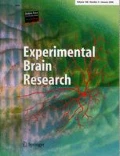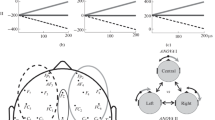Abstract
The current study examines the modulation of the motion-onset response based on the frequency-range of sound stimuli. Delayed motion-onset and stationary stimuli were presented in a free-field by sequentially activating loudspeakers on an azimuthal plane keeping the natural percept of externalized sound presentation. The sounds were presented in low- or high-frequency ranges and had different motion direction within each hemifield. Difference waves were calculated by contrasting the moving and stationary sounds to isolate the motion-onset responses. Analyses carried out at the peak amplitudes and latencies on the difference waves showed that the early part of the motion response (cN1) was modulated by the frequency range of the sounds with stronger amplitudes elicited by stimuli with high frequency range. Subsequent post hoc analysis of the normalized amplitude of the motion response confirmed the previous finding by excluding the possibility that the frequency range had an overall effect on the waveform, and showing that this effect was instead limited to the motion response. These results support the idea of a modular organization of the motion-onset response with the processing of primary sound motion characteristics being reflected in the early part of the response. Also, the article highlights the importance of specificity in auditory stimulus design.





Similar content being viewed by others
References
Butler RA (1968) Effect of changes in stimulus frequency and intensity on habituation of the human vertex potential. J Acoust Soc Am 44:945–950
Butler RA (1972) The influence of spatial separation of sound sources on the auditory evoked response. Neuropsychologia 10:219–225
Chait M, Simon JZ, Poeppel D (2004) Auditory M50 and M100 responses to broadband noise: functional implications. Neuroreport 15:2455–2458
Chase SM, Young ED (2005) Limited segregation of different types of sound localization information among classes of units in the inferior colliculus. J Neurosci 25:7575–7585. https://doi.org/10.1523/jneurosci.0915.05.2005
Dong CJ, Swindale NV, Zakarauskas P, Hayward V, Cynader MS (2000) The auditory motion aftereffect: Its tunning and specificity in the spatial and frequency domains. Percept Psychophys 62:1099–1111. https://doi.org/10.3758/BF03212091
Getzmann S (2009) Effect of auditory motion velocity on reaction time and cortical processes. Neuropsychologia 47:2625–2633. https://doi.org/10.1016/j.neuropsychologia.2009.05.012
Getzmann S (2011) Auditory motion perception: onset position and motion direction are encoded in discrete processing stages. Eur J Neurosci 33:1339–1350. https://doi.org/10.1111/j.1460-9568.2011.07617.x
Getzmann S, Lewald J (2010) Effects of natural versus artificial spatial cues on electrophysiological correlates of auditory motion. Hear Res 259:44–54. https://doi.org/10.1016/j.heares.2009.09.021
Getzmann S, Lewald J (2011) The effect of spatial adaptation on auditory motion processing. Hear Res 272:21–29. https://doi.org/10.1016/j.heares.2010.11.005
Getzmann S, Lewald J (2012) Cortical processing of change in sound location: smooth motion versus discontinuous displacement. Brain Res 1466:119–127. https://doi.org/10.1016/j.brainres.2012.05.033
Getzmann S, Lewald J (2014) Modulation of auditory motion processing by visual motion. J Neurophysiol 28:82–100. https://doi.org/10.1027/0269-8803/a000113
Gratton G, Coles MG, Donchin E (1983) A new method for off-line removal of ocular artefact. Electroencephalogr Clin Neurophysiol 55:468–484
Griffiths TD, Rees G, Rees A, Green GGR, Witton C, Rowe D, Büchel C, Turner R, Frackowiak RSJ (1998) Right parietal cortex is involved in the perception of sound movement in humans. Nat Neurosci 1:74–79. https://doi.org/10.1038/276
Grothe B, Pecka M, McAlpine D (2010) Mechanisms of sound localization in mammals. Physiol Rev 90:983–1012. https://doi.org/10.1152/physrev.00026.2009
Gruber T, Grandjean D (2017) A comparative neurological approach to emotional expressions in primate vocalizations. Neurosci Biobehav Rev 73:182–190. https://doi.org/10.1016/j.neubiorev.2016.12.004
Grzeschik R, Böckmann-Barthel M, Mühler R, Hoffmann MB (2010) Motion-onset auditory-evoked potentials critically depend on history. Exp Brain Res 2013:159–168
Grzeschik R, Böckmann-Barthel M, Mühler R, Verhey JL, Hoffmann MB (2013) Direction-specific adaptation of motion-onset auditory evoked potentials. Eur J Neurosci 38:2557–2565. https://doi.org/10.1111/ejn.12264
Grzeschik R, Lewald J, Verhey JL, Hoffmann MB, Getzmann S (2016) Absence of direction-specific cross-modal visual-auditory adaptation in motion-onset event-related potentials. Eur J Neurosci 43:66–77. https://doi.org/10.1111/ejn.13102
Haumann M, Corballis MC, Fabri M, Paggi A, Lewald J (2005) Sound lateralization in subjects with callosotomy, callosal agenesis, or hemispheroctomy. Brain Res Cogn Brain Res 25:537–546. https://doi.org/10.1016/j.cogbrainres.2005.08.008
Hillyard SA, Picton TW (1978) On and off components in the auditory evoked potential. Perc Psychoph 24:391–398
Jacobson GP, Lombardi DM, Gibbens ND, Ahmad BK, Newman CW (1992) The effects of stimulus frequency and recording site on the amplitude and latency of multichannel cortical auditory evoked potential (CAEP) component N1. Ear Hear 13:300–306
Jerger J, Martin J (2004) Hemispheric asymmetry of the right ear advantage in dichotic listening. Hear Res 198:125–136. https://doi.org/10.1016/j.heares.2004.07.019
King AJ, Schnupp JWH, Doubell TP (2001) The shape of ears to come: dynamic coding of auditory space. Trends Cogn Sci 5:261–270. https://doi.org/10.1016/S1364-6613(00)01660-0
Kreitewolf J, Lewald J, Getzmann S (2011) Effect of attention on cortical processing of sound motion: an EEG study. Neuroimage 54:2340–2349. https://doi.org/10.1016/j.neuroimage.2010.10.031
Krumbholz K, Hewson-Stoate N, Schönwiesner M (2007) Cortical response to auditory motion suggests an asymmetry in the reliance on inter-hemispheric connections between the left and right auditory cortices. J Neurophysiol 97:1649–1655. https://doi.org/10.1152/jn.00560.2006
Langers DRM, Krumbholz K, Bowtell RW, Hall DA (2014) Neuroimaging paradigms for tonotopic mapping (I): the influence of sound stimulus type. Neuroimage 100:650–662. https://doi.org/10.1016/j.neuroimage.2014.07.044
Magezi DA, Krumbholz K (2010) Evidence for opponent-channel coding of interaural time differences in human auditory cortex. J Neurophysiol 104:1997–2007. https://doi.org/10.1152/jn.00424.2009
Magezi DA, Buetler KA, Chouiter L, Annoni JM, Spierer L (2013) Electrical neuroimaging during auditory motion aftereffects reveals that auditory motion processing is motion sensitive but not direction selective. J Neurophysiol 109:321–331. https://doi.org/10.1152/jn.00625.2012
McAlpine D, Jiang D, Paler AR (2001) A neural code for low-frequency sound localization in mammals. Nat Neurosci 4:396–401. https://doi.org/10.1038/86049
McFadden D (1993) A speculation about the parallel ear asymmetries and sex differences in hearing sensitivity and optoacoustic emissions. Hear Res 68:143–151
Middlebrooks JC, Green DM (1991) Sound localization by human listeners. Annu Rev Psychol 42:135–159. https://doi.org/10.1146/annurev.ps.42.020191.001031
Ordonez-Gomez JD, Dunn JC, Arroyo-Rodriguez V, Mendez-Cardenas MG, Marquez-Arias A, Santillan-Doherty AM (2015) Role of emitter and severity of aggression influence the agonistic vocalizations of Geoffroy’s spider monkeys (Ateles geoffroyi). Int J Primatol 36:429–440. https://doi.org/10.1007/s10764-015-9833-5
Poirier C, Collignon O, DeVolder AG, Renier L, Vanlierde A, Tranduy D, Scheiber C (2005) Specific activation of the V5 brain area by auditory motion processing: an fMRI study. Cog Brain Res 25:650–658. https://doi.org/10.1016/j.cogbrainres.2005.08.015
Poirier C, Baumann S, Dheerendra P, Joly O, Hunter D, Balezeau F, Sun L, Rees A, Petkov CI, Thiele A, Griffiths TD (2017) Auditory motion-specific mechanisms in the primate brain. PLos Biol 15(5):e2001379. https://doi.org/10.1371/journal.pbio.2001379
Polich J (1989) Habituation of P300 from auditory stimuli. Psychobiology 17(1):19–28
Rayleigh L (1907) On our perception of sound direction. Philos Mag 13:214–232
Ritter W, Vaughan HG Jr, Costa LD (1968) Orienting and habituation to auditory stimuli: a study of short term changes in averaged evoked responses. Electroencephalogr Clin Neurophysiol 25:550–556
Schröger E (1996) Interaural time and level differences: integrated or separated processing? Hear Res 96:191–198
Smulders FTY, Miller JO (2012) The lateralized readiness potential. In: Luck SJ, Kappenman ES (eds) The Oxford handbook of event-related potential components. Oxford University Press, New York, pp 209–229
Stevens SS, Newman BB (1936) The localization of actual sources of sound. Am J Psychol 48:297–306
Sugg MJ, Polich J (1995) P300 from auditory stimuli: intensity and frequency effects. Biol Psychol 41:255–269
Teshiba TM, Ling J, Ruhl DA, Bedrick BS, Pena A, Mayer AR (2013) Evoked and intrinsic asymmetries during auditory attention: implications for the contralateral and neglect models of functioning. Cereb Cortex 23(3):560–569. https://doi.org/10.1093/cercor/bhs039
Tian B, Rauschecker JP (2004) Processing of frequency-modulated sounds in the lateral auditory belt cortex of the rhesus monkey. J Neurophysiol 92:2993–3013. https://doi.org/10.1152/jn.00472.2003
Tollin DJ (2003) The lateral superior olive: a functional role in sound source localization. Neuroscientist 9:127–143. https://doi.org/10.1177/1073858403252228
Towle VL, Bolanos J, Suarez K, Tan K, Grzeszczuk R, Levin DN, Cakmur R, Frank SA, Spire JP (1993) The spatial location of EEG electrodes: locating the best-fitting sphere relative to cortical anatomy. Electroencephalogr Clin Neurophysiol 86:1–6
Verkindt C, Bertrand O, Thevenet M, Pernier J (1994) Two auditory components in the 130–230 ms range disclosed by their stimulus frequency dependence. Neuroreport 5:1189–1192
Warren RL, Ramamoorthy S, Ciganovic N, Zhang Y, Wilson TM, Petrie T, Wang RK, Jacques SL, Reichenbach T, Nuttall AL, Fridberger A (2016) Minimal basilar membrane motion in low-frequency hearing. Proc Natl Acad Sci USA 113:4304–4310. https://doi.org/10.1073/pnas.1606317113
Wightman FL, Kistler DJ (1993) Sound localization. In: Yost WA, Popper AN, Fay RR (eds) Human psychophysics, 1st edn. Springer-Verlag, New York, pp 155–192
Woods DL, Alain C, Covarrubias D, Zaidel O (1993) Frequency-related differences in the speed of human auditory processing. Hear Res 66:46–52
Woods DL, Alain C, Covarrubias D, Zaidel O (1995) Middle latency auditory evoked potentials to tones of different frequency. Hear Res 85:69–75
World Medical Association (2000) Declaration of Helsinki: ethical principles for medical research involving human subjects. JAMA 284:3043–3045
Wunderlich JL, Cone-Wesson BK (2001) Effects of stimulus frequency and complexity on the mismatch negativity and other components of the cortical auditory-evoked potential. J Acoust Soc Am 109(4):1526–1537
Acknowledgements
The authors would like to thank Dr. Alexandra Ludwig on valuable feedback on a previous version of the article, Dr. Philipp Ruhnau for helpful discussions on the revision, Dr. Reshanne R. Reeder for proofreading the manuscript and two anonymous reviewers for valuable comments on the manuscript. The study was supported by a grant from the IMPRS NeuroCom of the Max Planck Institute for Human Cognitive and Brain Sciences (Leipzig, Germany) and by the Erasmus Mundus student exchange network in Auditory Cognitive Neuroscience (ACN).
Author information
Authors and Affiliations
Corresponding author
Ethics declarations
Conflict of interest
The authors declare that they have no conflict of interest.
Electronic supplementary material
Below is the link to the electronic supplementary material.
Rights and permissions
About this article
Cite this article
Sarrou, M., Schmitz, P.M., Hamm, N. et al. Sound frequency affects the auditory motion-onset response in humans. Exp Brain Res 236, 2713–2726 (2018). https://doi.org/10.1007/s00221-018-5329-9
Received:
Accepted:
Published:
Issue Date:
DOI: https://doi.org/10.1007/s00221-018-5329-9




